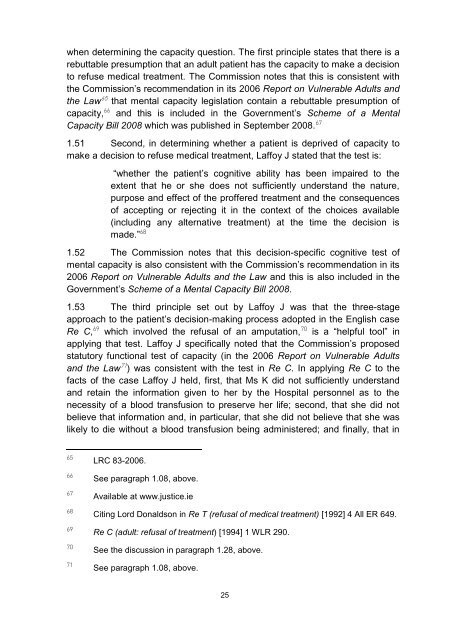Report on Bioethics: Advance Care Directives - Law Reform ...
Report on Bioethics: Advance Care Directives - Law Reform ...
Report on Bioethics: Advance Care Directives - Law Reform ...
Create successful ePaper yourself
Turn your PDF publications into a flip-book with our unique Google optimized e-Paper software.
when determining the capacity questi<strong>on</strong>. The first principle states that there is arebuttable presumpti<strong>on</strong> that an adult patient has the capacity to make a decisi<strong>on</strong>to refuse medical treatment. The Commissi<strong>on</strong> notes that this is c<strong>on</strong>sistent withthe Commissi<strong>on</strong>‘s recommendati<strong>on</strong> in its 2006 <str<strong>on</strong>g>Report</str<strong>on</strong>g> <strong>on</strong> Vulnerable Adults andthe <strong>Law</strong> 65 that mental capacity legislati<strong>on</strong> c<strong>on</strong>tain a rebuttable presumpti<strong>on</strong> ofcapacity, 66 and this is included in the Government‘s Scheme of a MentalCapacity Bill 2008 which was published in September 2008. 671.51 Sec<strong>on</strong>d, in determining whether a patient is deprived of capacity tomake a decisi<strong>on</strong> to refuse medical treatment, Laffoy J stated that the test is:―whether the patient‘s cognitive ability has been impaired to theextent that he or she does not sufficiently understand the nature,purpose and effect of the proffered treatment and the c<strong>on</strong>sequencesof accepting or rejecting it in the c<strong>on</strong>text of the choices available(including any alternative treatment) at the time the decisi<strong>on</strong> ismade.‖ 681.52 The Commissi<strong>on</strong> notes that this decisi<strong>on</strong>-specific cognitive test ofmental capacity is also c<strong>on</strong>sistent with the Commissi<strong>on</strong>‘s recommendati<strong>on</strong> in its2006 <str<strong>on</strong>g>Report</str<strong>on</strong>g> <strong>on</strong> Vulnerable Adults and the <strong>Law</strong> and this is also included in theGovernment‘s Scheme of a Mental Capacity Bill 2008.1.53 The third principle set out by Laffoy J was that the three-stageapproach to the patient‘s decisi<strong>on</strong>-making process adopted in the English caseRe C, 69 which involved the refusal of an amputati<strong>on</strong>, 70 is a ―helpful tool‖ inapplying that test. Laffoy J specifically noted that the Commissi<strong>on</strong>‘s proposedstatutory functi<strong>on</strong>al test of capacity (in the 2006 <str<strong>on</strong>g>Report</str<strong>on</strong>g> <strong>on</strong> Vulnerable Adultsand the <strong>Law</strong> 71 ) was c<strong>on</strong>sistent with the test in Re C. In applying Re C to thefacts of the case Laffoy J held, first, that Ms K did not sufficiently understandand retain the informati<strong>on</strong> given to her by the Hospital pers<strong>on</strong>nel as to thenecessity of a blood transfusi<strong>on</strong> to preserve her life; sec<strong>on</strong>d, that she did notbelieve that informati<strong>on</strong> and, in particular, that she did not believe that she waslikely to die without a blood transfusi<strong>on</strong> being administered; and finally, that in65666768697071LRC 83-2006.See paragraph 1.08, above.Available at www.justice.ieCiting Lord D<strong>on</strong>alds<strong>on</strong> in Re T (refusal of medical treatment) [1992] 4 All ER 649.Re C (adult: refusal of treatment) [1994] 1 WLR 290.See the discussi<strong>on</strong> in paragraph 1.28, above.See paragraph 1.08, above.25
















